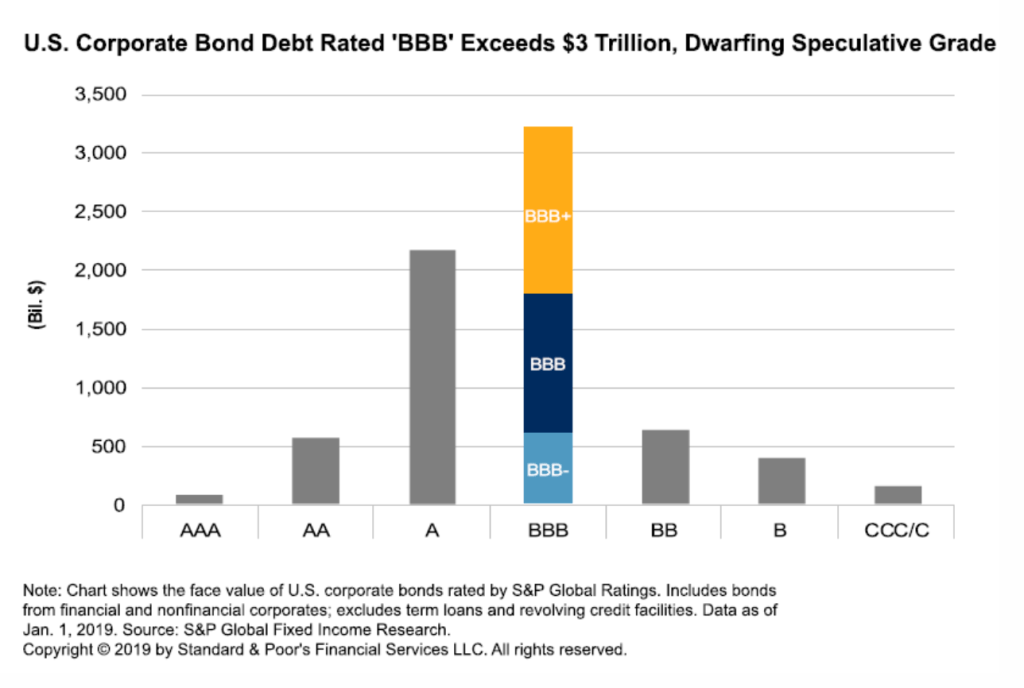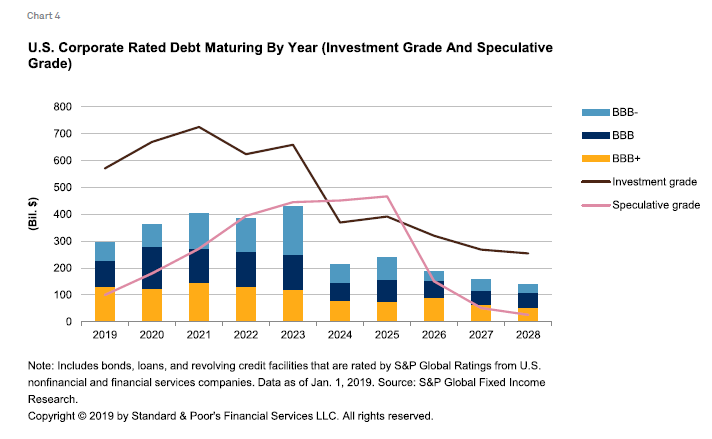While the mainstream financial media finally realizes that everything’s “not so great” in the global economy – there’s even more to worry about.
I’m talking about the ticking time-bomb in the corporate debt market. Which I believe will play a large role in the next financial crisis.
Let me explain. . .
After years of corporations gorging on ‘cheap’ debt – thanks to the Federal Reserve’s post-2008 zero interest rate policy (ZIRP) – many are now at the edge of seeing their credit ratings downgraded.
To put things into perspective – according to S&P Global (NYSE:SPGI) – there’s over $7 trillion worth of BBB-rated debt (including notes, bonds, term loans, and revolving credit lines) worldwide. (With $3.5 trillion belonging to U.S. firms).
Why does this matter?
Because BBB-rated debt is the last notch in the investment-grade (IG) level. And anything below is considered speculative grade (aka junk) – meaning there’s suddenly a much higher chance of default.
Now – before I go on – here’s some context about investment grade and junk debt.
When a credit agency (like S&P or Moody’s) labels a corporation’s debt investment grade (BBB and higher) – it’s technically saying that it believes based on the company’s current financials and economic outlook that the chance of a default is minor. (A firm with a higher credit rating means they pay less interest).
But when the credit agency labels a corporation’s debt junk (BB or lower) – it’s saying there’s a high chance that a firm may default on their creditors. (A firm with a lower credit rating means they pays more in interest).
Also – keep in mind that many institutional investors – such as insurance firms, pension funds, some mutual funds and exchange-traded funds (ETF’s) – can’t legally own anything lower than investment grade debt. (This means money managers would be forced to dump these holdings – leading to a sharp drop in bond prices).
Thus – you can see how fragile things are when 53% ($3.2 trillion) of the total investment grade debt category in the U.S. is BBB-rated. (Just one step away from being labeled junk).

All this is why I believe that the corporate debt market is nearing a ‘tipping-point’ – especially as economic conditions worldwide worsen. And dollar-liquidity continues drying up.
For instance – making matters worse – there’s roughly $1.9 trillion in BBB-rated U.S. corporate debt that’s maturing over the next four years. . .

This means many of these firms must either repay creditors the full principle owed with cash on hand. Or roll-over (refinance) their existing debt (meaning they will need take out new debt to repay old debt).
But – since most of these firms are near-junk already – I’ll assume most don’t have the cash on hand to repay the maturing debts. Thus needing to borrow more.
The problem is – if economic conditions continue to sour – then these BBB-rated firms will be stuck between a rock-and-hard-place.
On the one side – during an economic downturn – creditors hold more cash or buy U.S. government bonds. (Some may lend to firms, but only those of the highest quality). So they won’t be freely lending to near-junk rated firms.
And on the other side – during an economic downturn – these BBB-rated firms will be at risk of their credit ratings dropping as their earnings decline. Making it even more difficult to find creditors willing to lend them capital.
Thus – it’s clear if the global economy continues weakening that these firms won’t have access to cash when they need it most. (Which is historically what leads to a wave of corporate defaults). . .
So – in summary – the massive amount of near junk-rated debt (BBB) has put investment grade bondholders (pension funds, insurance firms, etc) in a very fragile position. Especially as economic conditions continue declining.
Making matters worse – most of these firms only piled on debt to fulfill short-term agendas – such as buying back stock or paying dividends.
But such superficial tactics rarely ever work out well in the long-term.
Thus – in the near future – many of these firms may pay for their short-term thinking.
So don’t be surprised if the high-yield bond market (the junk market) begins choking on all these ‘fallen angels’. (The name given to investment grade firms when they’re downgraded to junk).
I know I won’t.
One thing that will help these BBB-rated firms is if the Federal Reserve ends up cutting rates – which many now expect. So take that into account.
I’m not opposed to buying junk bonds. Some offer significant positive asymmetry. But I’ll wait first until the next downturn when they’re greatly discounted – and only then.
